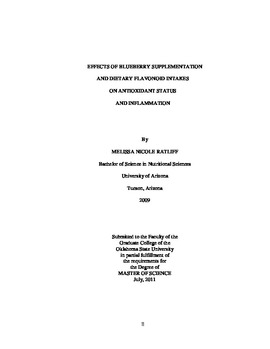| dc.contributor.advisor | Basu, Arpita | |
| dc.contributor.author | Ratliff, Melissa Nicole | |
| dc.date.accessioned | 2014-04-15T22:01:29Z | |
| dc.date.available | 2014-04-15T22:01:29Z | |
| dc.date.issued | 2011-07-01 | |
| dc.identifier.uri | https://hdl.handle.net/11244/9266 | |
| dc.description.abstract | The objective of our study was to investigate the effects of blueberry flavonoids on inflammation and antioxidant status in subjects identified with Metabolic Syndrome. Nineteen subjects identified with metabolic syndrome were assigned to consume a 50 gram dose of freeze-dried whole blueberry drink daily for 8 weeks while 12 subjects were assigned as controls and consumed equivalent fluid amounts daily for 8 weeks. Subjects in both groups kept a 3-day food record dietary flavonoid intake for analysis. Blood draws and anthropometrics were performed at baseline and at 8 weeks. Blueberry supplementation did not significantly alter CRP, IL-6, and adiponectin. At week 8, Quercetin and EGCG were significantly higher in the blueberry group compared to the control (Blueberry: 22198.48 mg, Control: 5768.14 mg p=0.047; Blueberry: 284.99 mg, Control: 9.33 mg, p=0.035, respectively). Thus, blueberry supplementation did not alter markers of inflammation, and the antioxidant effects may be attributed to the decrease in serum carotenoids, specifically lycopene in the blueberry group compared to the control at week 8 (6.874.66 g/mL to 4.832.70 g/mL). In conclusion, the results of the study presented indicated that blueberry supplementation in subjects with metabolic syndrome does lower blood pressure and has some positive effect on serum carotenoid levels and reinforces the need to further understand this condition. Evidence is emerging that suggests antioxidants may provide nutritional benefits to reducing the risk of chronic disease such as cardiovascular disease, hypertension, and thus, metabolic syndrome. The results from this study suggest that blueberry supplementation is responsible for lowering blood pressure but it has yet to be determined as to how much the blueberry antioxidants affect biomarkers of inflammation and the other parameters of the metabolic syndrome. | |
| dc.format | application/pdf | |
| dc.language | en_US | |
| dc.publisher | Oklahoma State University | |
| dc.rights | Copyright is held by the author who has granted the Oklahoma State University Library the non-exclusive right to share this material in its institutional repository. Contact Digital Library Services at lib-dls@okstate.edu or 405-744-9161 for the permission policy on the use, reproduction or distribution of this material. | |
| dc.title | Effects of Blueberry Supplementation and Dietary Flavonoid Intakes on Antioxidant Status and Inflammation | |
| dc.type | text | |
| dc.contributor.committeeMember | Shriver, Lenka | |
| dc.contributor.committeeMember | Betts, Nancy M. | |
| osu.filename | Ratliff_okstate_0664M_11333.pdf | |
| osu.college | Human Environmental Sciences | |
| osu.accesstype | Open Access | |
| dc.description.department | Department of Nutritional Sciences | |
| dc.type.genre | Thesis | |
| dc.subject.keywords | antioxidant status | |
| dc.subject.keywords | blueberry supplementation | |
| dc.subject.keywords | inflammation | |
| dc.subject.keywords | metabolic syndrome | |
